My daughter attended Washington University in St. Louis and posted this story the other day on Facebook. It's an interesting story, one I hope you'll all take the time to read this.
I've included the link to the story, as well as a cut and paste to be sure you all are able to see it in one format or another.
Story Link,
As a new employee at Washington University in St. Louis in the 1980s, Barbara Rea heard the rumors about Sam Lachterman and Betty Wynn, the homeless couple who were omnipresent on campus for decades.
Rumor one: Lachterman and Wynn, known to generations of students simply as Sam and Betty, were brother and sister.
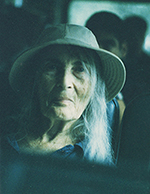
Wynn and her brother Sam Lachterman would buy monthly bus passes to travel to Washington University to attend free lectures and events. “It was one of the few things they spent money on,” said friend Pat Zollner. “They never bought anything from a store.”
Rumor two: Both graduated from Washington University.
Also true: Wynn earned a degree in social work in 1936; Lachterman earned a PhD in mathematics in 1963. His dissertation was titled “Exponentially Convex Functions on a Cone in a Lie Group.”
Rumor three: The pair would sleep on the fifth floor lounge of Olin Library on the Danforth Campus.
Maybe true, maybe not. Rea, formerly a special projects coordinator for University Libraries, often observed the couple leave Olin as she arrived in the morning.
“But who knows,” said Rea, now director of the Assembly Series. “The legends just swirled around them. We knew they were brilliant, but there was so much more we didn’t know about their lives.”
For example, despite their appearance and their lifestyle, Lachterman and Wynn were not destitute. In fact, the pair possessed a small savings and willed $54,000 of their estate to Washington University.
“My first reaction was shock,” Rea said upon hearing of the bequest. “My second reaction was deep gratitude. I sat next to Sam at many Assembly Series lectures and really enjoyed his dry wit.
Half of that money will fund “Three Acts, Two Dancers, One Radio Host,” a joint presentation of the Assembly Series and Edison Theatre at 8 p.m. Saturday, Nov. 1 and 2 p.m. Sunday, Nov. 2. The other half has been distributed among the School of Law, the Kemper Art Museum, and the departments of mathematics, physics and music, all in Arts & Sciences.
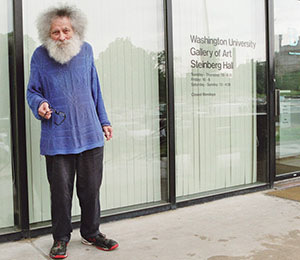
COURTESY OF JOHN SARRA/SAM FOX SCHOOL
Lachterman in his later years in front of Steinberg Hall.
“We felt it was really important to present something they would want to see. Though, really, we could have picked almost anything because Sam and Betty embraced every subject you can imagine.”
‘If they came to the tea, they came to the talk’
From the 1970s until Wynn’s death in 2006, Wynn and Lachterman frequented hundreds of lectures, symposiums, exhibits and performances. They came for the conversation, but stayed for the cheese and crackers.
Detractors derided them as freeloaders, and succeeded in banning the pair — and the parked car in which they lived — from the campus in the late 1970s. The backlash from students and faculty was swift and, within days, Lachterman and Wynn were back posing questions and grazing the fruit tray at public events and lectures. Their champions argued that Lachterman and Wynn posed no harm. In fact, they enriched the university’s intellectual life.
“They would never miss a tea, which were quite lavish back then,” recalled Edward N. Wilson, PhD, professor emeritus of mathematics. “But if they came to the tea, they came to the talk.
“Betty could be quite challenging and had a lot of interesting things to say,” Wilson said. “Sam rarely asked questions, but he was a great thinker. So what if much of tea ended up in their shopping bags? Nearly all of my colleagues would say, ‘They’re welcome to it.’ They were not merely tolerated; they were loved by hundreds of people on campus.”
Loved, but not fully understood. Lachterman and Wynn shared a complicated and, at times, tragic history.
“There is the Sam and Betty no one knew,” said Pat Zollner, who served as an administrative assistant at Washington University for two decades and, ultimately, as Lachterman’s caregiver in his final years. “Betty would always say, ‘There is something wrong with us.’ ”
Professionals to poverty-stricken
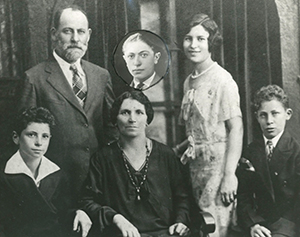
A picture of Harry Lachterman, who died at 19 of pneumonia, is pasted into the center of this family photo. Betty is standing at right alongside her father. Sam sits to the left of his mother.
“‘My mother looked at me like she hated me,’” Lachterman told Zollner.
“I told him, ‘Sam, your mother loved you. She was just overwhelmed by pain of losing a child and the guilt she felt for what she did to you,’” Zollner said.
The siblings attended Soldan High School, where they both played tennis. Wynn then attended Washington University, where she studied social work. She married, but her husband died a year later.
“Betty never wanted to talk about it,” Zollner said. “Out of respect to her, I can only say that the circumstances of his death were very, very tragic.”
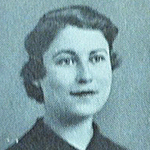
Wynn in the 1936 edition of the Hatchet yearbook
“I’d like a job which would be more intellectually stimulating and possibly more socially useful than my present one, which is largely routine in nature,” the resume stated.
Cowdry wrote letters on her behalf to the U.S. Department of State and the World Health Organization. Apparently nothing came of those inquiries because Wynn stayed in St. Louis as a social worker for the U.S. Department of Veterans Affairs.
Lachterman followed his sister to Washington University, where he was a member of Phi Beta Kappa, the distinguished academic honorary. He enlisted in the Air Force and served in World War II in the Marshall Islands as a meteorologist.
After the war, Lachterman returned to Washington University, where he taught classes while he earned his PhD. After graduation, Lachterman served as tenured professor at Saint Louis University. He left after a decade. Lachterman told Zollner administrators wanted him to dumb down his classes. Wilson had heard another story.
“He was not too impressed with authority and that became a problem,” Wilson said.
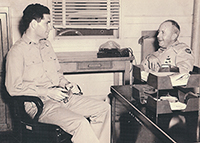
Lachterman (left) served as a meteorologist during World War II.
Either way, Lachterman and Wynn went from middle-class professionals to vagabonds almost overnight. The transformation was as stunning as it was mysterious. Yes, Lachterman was stubborn and, by his own admission, hated to work. And Wynn rejected consumer culture and identified as a socialist. But it’s one thing to quit the rat race; it’s another to carry one’s earthly belongings in shopping bags.
“That was the much debated question – how did it come to this?” Wilson said. “There was endless speculation.”
Zollner also is stumped. Once she learned of the couple’s savings, she asked Sam, “Why did you have to suffer?”
“He didn’t have an answer,” Zollner said.
‘The most refined people I’ve ever met’
Julius Lachterman was ashamed of his siblings, but he did make provisions for Lachterman and Wynn to live in his house in the St. Louis suburb of Olivette, Mo., upon his death in 1997. The siblings eventually purchased the house from the estate. Zollner suspects Wynn resented the house, which functioned more as a dumping ground for magazines, theater programs and albums, than a home.
“They paid their taxes, their utilities, the little neighborhood fee, but they couldn’t handle having a house,” Zollner said. “Even the oven was filled with papers.”
Wynn died in 2006 at 91. Authorities condemned the house and told Lachterman he would need to live in a shelter. Zollner stepped in and invited him to live with her. She recalls visiting the house to help Lachterman collect some things.
“We walked into his room,” she said. “It was in no way tidy, but the bed was clear and he had everything in neat stacks.
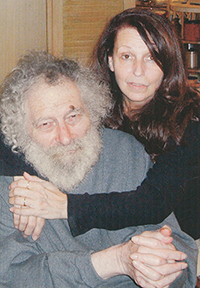
Pat Zollner, a former university administrative assistant and longtime friend, cared for Lachterman during his final years. “We laughed and laughed,” she said.
Every day for three months, Zollner and a friend helped Lachterman clean the home. They filled three 40-foot dumpsters. Among the paper napkins and old clothes, Zollner found what she calls Wynn’s “Rosebud” – a letter from Margot Einstein, the stepdaughter of Albert Einstein.
The note, written in response to a sympathy card Wynn sent after Albert Einstein’s death read: Your beautiful card is on my little table next to my bed. It is true what you said about my father without having known him. I shall keep your letter with me knowing that there are people who truly understood and loved him.
Eventually, inspectors allowed Lachterman to return to his home. Zollner would send friends over during the day but once Lachterman started to suffer small strokes, Zollner retired from the university and cared for him.
Zollner subscribed to cable television so Lachterman could watch old movies on Turner Classic Movies and adopted two cats that would sleep next to him. She took him to Opera Theatre of St. Louis, doctors’ appointments and to vote for Barack Obama in 2008.
“That was one of his happiest moments,” Zollner said.
He died peacefully the following year. Friends called Zollner Lachterman’s angel, a title she rejects.
“I’m not an angel; I’m just an old hippie,” said Zollner, who inherited Lachterman and Wynn’s house. “Really, I feel like I am the lucky one.
“Imagine what is was like to have someone who knew so much about so much as a best friend. It didn’t matter how Sam and Betty looked, they really were the most refined people I’ve ever met.”

Beautiful rose. And an interesting story. You just never know who the homeless person is or what they did for a living before becoming homeless.
ReplyDeleteThis was a wonderful story which I thoroughly enjoyed reading. Is the beautiful white rose from your yard as well?
ReplyDelete